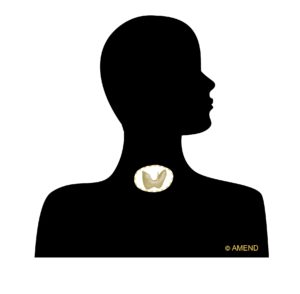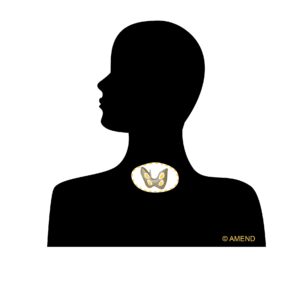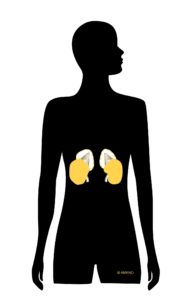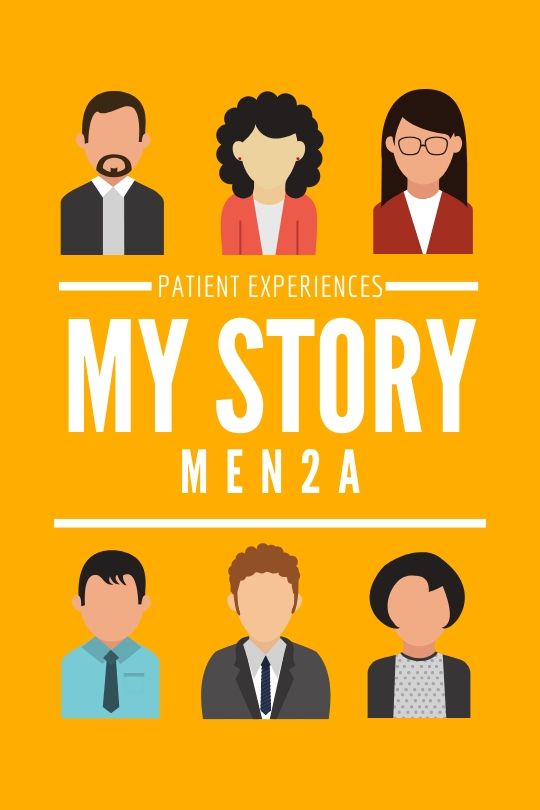What is MEN2 (MEN2a)?
There are three types of growth that can occur in MEN2. These occur in the butterfly-shaped thyroid gland in the neck, the parathyroid glands that lie close to or within the thyroid, and in the adrenal glands that sit on top of each kidney. Although most of the growths are benign (not cancer), the growth in the thyroid gland is always cancerous (medullary thyroid cancer or MTC). Each type of growth may occur alone and independently of MEN.
Blood and urine tests for hormone levels as well as scans of the neck and abdominal area are all used to check for growths. If a growth is found an operation may be needed to remove either just the growth itself or the whole of the affected gland. This is sometimes necessary in early childhood.
-
Thyroid Cancer
The butterfly-shaped thyroid gland is found at the base of the throat in the front of the neck. Almost 10 out of 10 (100%) of MEN2a patients will develop medullary thyroid cancer (MTC) by the time they are aged 40. The thyroid cancer or the pre-cancerous hyperplasia, may be found using blood tests to measure levels of calcitonin. Treatment involves an operation to remove the thyroid gland and the nearby lymph nodes (total thyroidectomy).
After the operation lifelong medication called Thyroxine needs to be taken. If calcitonin is still detected after the operation, further operations and other therapies are used to control it. MTC is usually slow growing and may often be managed effectively in this way without symptoms for many years. Children identified as having MEN2 are offered a thyroidectomy before the age of 5. Parathyroid glands are sometimes unavoidably removed at the same time as the thyroid gland (see parathyroids).
-

-
Parathyroid Glands
These small glands lie just next to or are sometimes embedded within the butterfly-shaped thyroid gland in the neck. Less than 1 in 4 (25%) of MEN2a patients will develop a parathyroid growth. These growths release large amounts of parathyroid hormone (PTH) and so can be easily found using blood and urine tests. Some symptoms of an untreated parathyroid growth include irritability, ulcers, kidney stones, pancreatitis, bone fractures, osteoporosis, tiredness, muscle or bone pain, indigestion, poor memory and constipation. However most patients will have very few of these symptoms particularly when diagnosed and treated early on.
At the moment, the recommended treatment for parathyroid growths is a relatively small operation to remove all of the glands, and involves only a few days in hospital. Possible medications to control parathyroid growth are currently being researched. After parathyroid glands are removed, patients may have to take a Vitamin D capsule to help the body absorb calcium.
-

-
Adrenal Glands
The body’s two adrenal glands are normally each about the size of a whole walnut and sit just on top of the kidneys. A growth of the inner part of the adrenal gland is called a phaeochromocytoma (fee-o-cromo-sy-toma) and is almost always benign (not cancerous) in MEN. Phaeochromocytomas may grow for many years without causing severe symptoms but can be activated by events such as childbirth or surgery. Symptoms are varied and may include all or some of the following: sudden migraine-like headaches, palpitations, breathlessness, excessive sweating, high (or rarely low) blood pressure (constant or off- and-on), trembling, tiredness, depression, anxiety, and nausea with or without vomiting.
These growths may be detected using blood and urine tests as well as several different types of scan. Treatment involves an operation to remove the gland and growth. A period of medication before surgery is necessary to control the unstable blood pressure. If both adrenal glands are removed, lifelong medication is necessary.
-

Author: Jo Grey with the help of the AMEND Medical Advisory Team
Further Reading
-
MEN2a Patient Information Book

3rd Edition (2015) of our popular patient information booklet on MEN2a - now with added Glossary. Members who register receive a free hardcopy in their Membership Welcome Pack.
View Booklet
Patient Stories
-
Patient Stories

A number of our members have written about their journeys with MEN2 to help inform and perhaps also inspire others.
Click here to read more
-
My Story Template

Want to write your own story but don't know where to start? Use our handy template for inspiration! Just scan and send by email or pop it in the post.
Click here to download the template
2021 Videos
Come and meet Liz, Laura and Mandi and hear their experiences of diagnosis and treatment in MEN2A, as well as how they feel that their disease may affect their futures. Huge thanks to Liz, Laura and Mandi for participating in this project!
The following videos were produced Red Goat Productions thanks to a grant from Ipsen, and launched in September 2021.
-
Living with MEN2A - Diagnosis
-
Living with MEN2A - Treatment
-
Living with MEN2A - Future
Click here to view more videos on our YouTube channel
References and Information Production
Be involved
-
Make a donation
AMEND has a variety of ways to donate to show your appreciation for our work.
Donate now
-
Become an AMEND member
Membership is free so come and join our family
Join us
-
Latest News
AMEND is pleased to bring you our latest publication: ‘Starting a Family: Your Choices’. Funded by a grant from the Society for Endocrinology, this…
View News